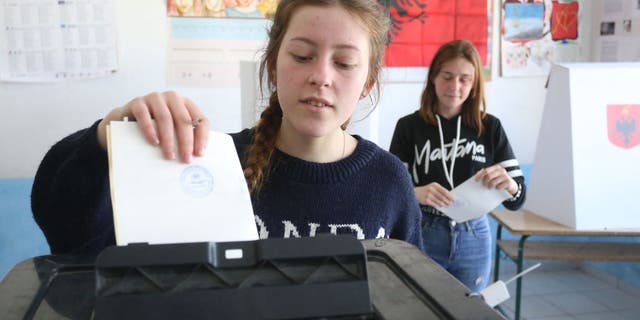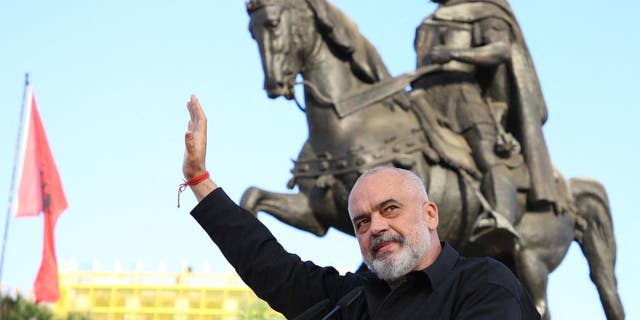As Albanians go to the polls on May 14 in local elections in a region that many experts and policymakers consider a tinderbox in Europe’s tumultuous Balkans region, critics worry that the Biden administration has retreated from the former communist county.
“Albania has been a NATO member in good standing, serving as a stabilizing force within NATO that Russia is trying to divide. Albanian troops served alongside the U.S. military in Kosovo, Iraq and Afghanistan,” Rebekah Koffler, a former defense intelligence analyst, told Fox News Digital.
While Albania’s democratic credentials are seriously questioned, the small Balkan nation, one of Europe’s poorest, has made significant contributions to U.S. foreign policy goals over the years.
Albania, once an authoritarian Marxist country with bitter relations with the U.S. during the Cold War, is now one of the most pro-U.S. countries in Europe and has a large diaspora community in the United States. But the amount of attention Albania receives from President Biden and Western policymakers is little for a country struggling to consolidate its democracy.
LONGTIME FOES SERBIA AND KOSOVO NEARING NORMALIZATION OF RELATIONS

A woman casts her ballot at a voting station in the village of Paskuqan, near Tirana, during Albanias’ Parliamentary elections on April 25, 2021. Albanians vote in municipal elections on Sunday. (Photo by GENT SHKULLAKU/AFP via Getty Images)
“Historically, it’s been the United States that has shown leadership in the Balkans, and corralled the rest of Europe towards resolving the conflicts of the region and setting the current political and security architecture in the region,” former Albanian Ambassador to the U.S. and the United Nations, Agim Nesho, told Fox News Digital. “This was especially the case during the Clinton and Bush 43 administrations. However, the focus shifted during the Obama and Trump administrations, giving space to special interests to push dangerous new projects anchored on autocrats like Prime Minister Rama and Serbian President Aleksander Vucic, such as the Open Balkans initiative.”
Along with Vucic, Rama is a co-leader of the “Open Balkans” initiative, a proposal that would facilitate a freer flow of people and goods across the Balkans, which on the surface seems like it would benefit the entire region. But many people in Albania and across the Balkans in Montenegro, Kosovo, and Bosnia and Herzegovina oppose the initiative over fears that it is a Serbian ploy to supplant the common regional market of Europe and would threaten Balkan countries’ desire to join the EU.

Albania’s Prime Minister Edi Rama (R) and Serbia’s President Aleksandar Vucic shake hands as they hold a news conference during the Regional Meeting Western Balkans in Ohrid on November 10, 2019. Photo by ROBERT ATANASOVSKI/AFP via Getty Images)
“The Open Balkans initiative seeks to redraw everything from borders to economic, political and military interest in the Balkans, by bringing in the influence of Russia and non-Western actors like Turkey and China into play, and risks renewed conflict in the region,” Ambassador Nesho warned.
Albania may be a small and neglected nation, and while it struggles with the rule of law, organized crime and corrupt institutions, a strong turnout and clean electoral process without any irregularities will be a beacon of hope for a region caught between a democratic West and an authoritarian east, mainly championed by Russia.
US WARNS RUSSIAN-LINKED ACTORS SEEKING TO ‘FOMENT MANUFACTURED INSURRECTION’ IN EUROPEAN COUNTRY
“U.S. foreign policy, if it continues to be indifferent and pragmatic in its policy towards the Western Balkans, will lose the Balkans and its influence in the region,” Ambassador Nesho said.
Polls open on Sunday, and Albanians will elect mayors and members of local councils across 61 municipalities. The last local elections held in 2019 were boycotted by opposition parties, leading to a rout by the ruling Socialist Party.

Albania’s Prime Minister Edi Rama waves as he addresses his supporters in the central square of Tirana, following his Socialist Party election victory on April 27, 2021. (Photo by GENT SHKULLAKU/AFP via Getty Images)
The main parties vying for power in the local elections include Prime Minister Edi Rama’s Socialist Party, the center-right Democratic Party and the Together We Win coalition, an offshoot of the Democratic Party.
Although Albania does have competitive elections, they are often marred by corruption and allegations of vote–buying, worrying many international election observers. Many of the cases of vote-buying and rigging involve Rama’s Socialist Party. One notable example saw the chief of police in one region mobilize the entire force to block buses loaded with opposition supporters, a clear instance of voter suppression and intimidation.
The Organization for Security and Co-operation in Europe (OSCE) will have about 300 short-term observers throughout the country to monitor polling stations and counting of the votes.
Allegations of electoral corruption are not new in Albania, and it has been become a widespread feature of elections throughout the years. Freedom House, which tracks democracy standards around the world, notes that some voters in previous elections have reported being threatened with being fired or loss of benefits, depending on how they vote. It’s also common for criminal organizations to have an influence on Albanian politics.
HISTORIC RUSSIAN ALLY SNUBS PUTIN IN GROWING SHIFT TO EUROPEAN UNION
International election observers from the U.S. and EU will be closely monitoring the vote.
“Our expectation is that a country like Albania, which is a member of NATO and an aspirant for EU membership, will do it’s very best to ensure that the elections are conducted in accordance with international standards and norms. We also know that there is room for improvement,” U.S. Ambassador to Albania, Yuri Kim, said in a recent interview.
The State Department directed Fox News Digital to a series of tweets from the U.S. Embassy regarding the election. The tweets called on authorities to respect the call for free and fair elections.
Koffler warned that “Unless team Biden re-engages in the Balkans, including Albania, and pronto, Putin and even China are likely to be already filling the vacuum, as they have done in other places, such as in Syria, when Obama withdrew, and many parts of Africa.”
Fox News Digital reached out to the Foreign Ministry of Albania for comment but did not hear back by publication time./foxnews






















































